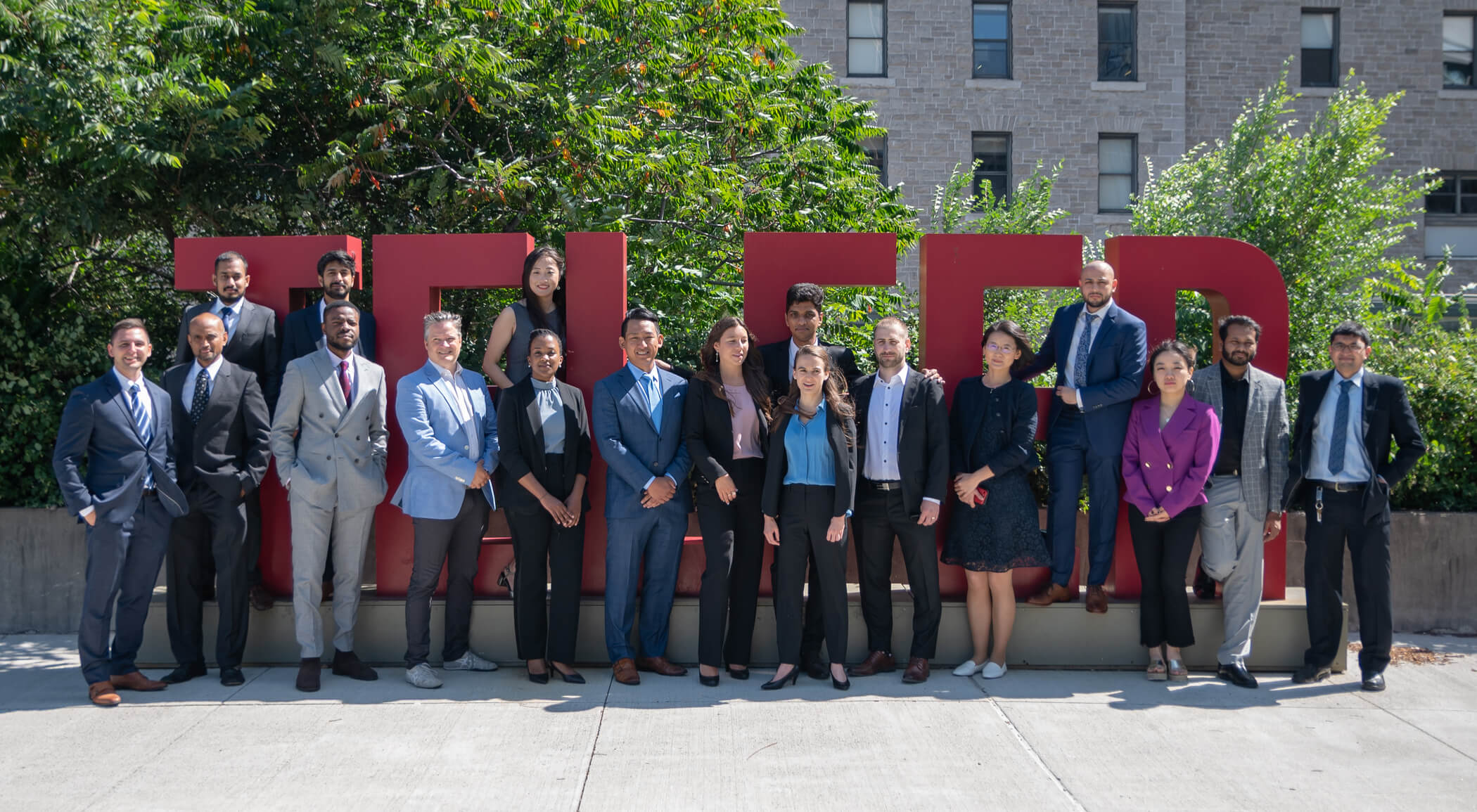Deciding to pursue an MBA can be difficult and knowing how to choose your MBA can be even more difficult, with many different factors to consider before making your decision.
It’s important to draw up a personalized plan that considers your skills, academic background, and overall career goals when deciding on your MBA.
Along with assessing these criteria, you should also ask yourself a few important long-term questions:
Where do you see yourself in five years or a decade from now?
What have you accomplished so far, and where do you want to go next?
How will the program help you enter your desired industry or sector?
Choosing to pursue an MBA can be a big decision, so asking the right questions is a good place to start. These questions can help you choose a program that will help you achieve your long-term goals.
The Telfer School of Management offers a variety of options so you can personalize your degree to gain the skills, knowledge, and learning experiences you need to advance in your career.
We asked five Telfer MBA students what they took into consideration when choosing their MBA. Here’s what they had to say:
Cost
Among most students, cost is the biggest consideration. MBA programs can be expensive, so it’s important to find one that checks all your boxes. And given the pandemic, spending exorbitant amounts on tuition is a major concern for most students.
According to Statistics Canada, for the 2020-2021 academic year, the average cost of tuition for an MBA program in Canada is almost $30,000, while on average, EMBAs cost over $50,000, but fees vary from one institution to the next.
MBA stats point to a 100% employment rate within 9 months of completing an MBA, with an average salary of $97,500 three months after graduation, and a 27% average salary increase three months after graduation.
The importance assigned to cost will differ from person to person. The key is to make your own list of pros and cons to help you decide on how much this factor weighs in your choice of MBA.
Length of Program: Full-Time or Part-Time
With so many options available, it can be hard to make the right decision about the length of your MBA program. Before you start your MBA application, you should decide which MBA program length is right for you.
Full-time MBA programs are ideal for students who can commit to two years of study. Full-time MBA programs can’t always accommodate work schedules, so consider whether you’re willing to quit your current job. Some full-time MBA programs can also be good for students with limited experience or who are starting their careers.
Part-time MBA programs typically take about three years to complete. If you’re already working but want to pursue your MBA at the same time, a part-time MBA program may be your best bet. You’ll have access to the same faculty and resources as other MBA students, but you’ll have more flexibility and work-life balance.
Accelerated MBA programs are typically 12-to-18 months’ long. Consider this option if you have a strong professional background and/or an undergraduate degree in business but still want to gain more experience.
The Telfer MBA is a professional two-year program (offered in English or French), which aims to help you move on to your next challenge or maximize learning and career development simultaneously.
Specializations Offered
To make the most of your MBA, it’s important to study something that is relevant to your academic background as well as something that truly sparks your interest.
There are different concentrations offered at different schools, which means you can choose a specific concentration or specialization during your MBA program. In addition to providing a more focused education, specializations make it possible for MBA graduates to concentrate on a particular subject area.
Although many MBA programs can have similar modules, each has its own unique focus. Knowing what you want to get out of your MBA experience will help you choose from these options and find a program that aligns with your personal interests.
Telfer offers a professional MBA, that allows you to customize your degree to gain the specialized skills and expertise that employers want.
You can choose from one of four concentrations: Digital Transformation and Analytics (DT&A), Finance, Management Consulting, and Sustainable Management.
Location

Location is another important factor to consider when choosing an MBA. It makes sense to pick a program in a location that best suits your lifestyle and environment, so you can live comfortably while completing your MBA.
Reflect on which industries and companies you’d be interested in before you start your MBA. This will help you in consider programs that may offer internships in your preferred industry.
Taking your own personality into consideration is also important when deciding the right location for your MBA. Ask yourself whether you prefer smaller towns with fewer people or big busy cities.
You should also consider your financial situation when deciding where to study: some cities are more expensive than others. The most important factor to consider when thinking about a program location is whether it will provide enough opportunities for your own long-term career goals.
Location is also important if you already have a job or commitments, in which case, you may not want to move away from your current city. If this is the case, consider MBA programs in your city.
Ottawa is considered a good location for an MBA since it is surrounded by nature and offers year-round entertainment and activities.
The University of Ottawa campus is in the downtown core, which gives you access to the national capital region. Studying in Ottawa also provides opportunities to find jobs in the public and private sectors in various industries.
Method of Study
One of the most important factors to consider in choosing your MBA is whether the program is offered in person, online, or as a mix of both.
What are the pros and cons of an online MBA vs. an in-person MBA? Both in-person and online programs include advantages and disadvantages.
Online MBA programs have more flexibility: they allow students to continue working while completing their projects and assignments. However, in-person programs allow for more interaction and networking opportunities.
If you prefer interactive, on-campus learning environment, then an in-person MBA may be your best fit. In addition to in-person discussions with professors and peers, you can also use on-campus resources, such as the library, athletic facilities, and extracurricular activities when studying in person.
Telfer’s MBA program is not online, but there is an option to pursue a hybrid professional MBA in French. Our MBA offers hands-on experiences and emphasizes team learning, which allows you to collaborate closely and learn from your peers and professors in small classes of no more than 50 students.
Student Experience
Joining a community that will support you throughout your life is a big advantage of completing an MBA, so it’s important to choose a program that values the student experiences and helps you build lifelong connections.
Telfer’s MBA really emphasizes the student experience by offering many activities and resources for students to explore.
These opportunities include many events and conferences for MBA students, MBA clubs such as the Telfer MBA Student Association (MBASA), national and international MBA games and case competitions, on-campus, and off-campus housing, and much more.
Being part of a school with a strong sense of community can truly help make your experience as an MBA student worthwhile.
And being a member of Telfer Nation means you are a part of an inclusive community that is open to all. Whether you are a student, faculty or staff member, alumni, supportive family member, industry professional, or simply a curious person who shares our vision and values: you always have a place in our community.
Career Guidance
When choosing your MBA, one of the most important factors is picking a school that can support you in reaching your career goals. A good way to see if a school does this is by researching different school websites and seeing what types of resources and tools, they offer their students.
During your MBA, it’s important use the resources available to you to seek support from the school and its staff. Many schools, including Telfer, offer career guidance for MBA students.
The resources of the Telfer Career Centre are useful in making the most of your MBA experience. The Telfer Career Centre sponsors a host of programs, events, job postings, and more, along with first-class counselling, to help you reach your career goals.
To summarize, remember to analyze factors such as cost, length of program, specializations offered, location, method of study, student experience, and career guidance resources when deciding on an MBA program that’s right for you. Asking the right questions can help you make the right decision based on your personal goals.
Still not sure how to choose your MBA? Register for Telfer’s next MBA info session to figure out which MBA program can help you reach your personal goals.











